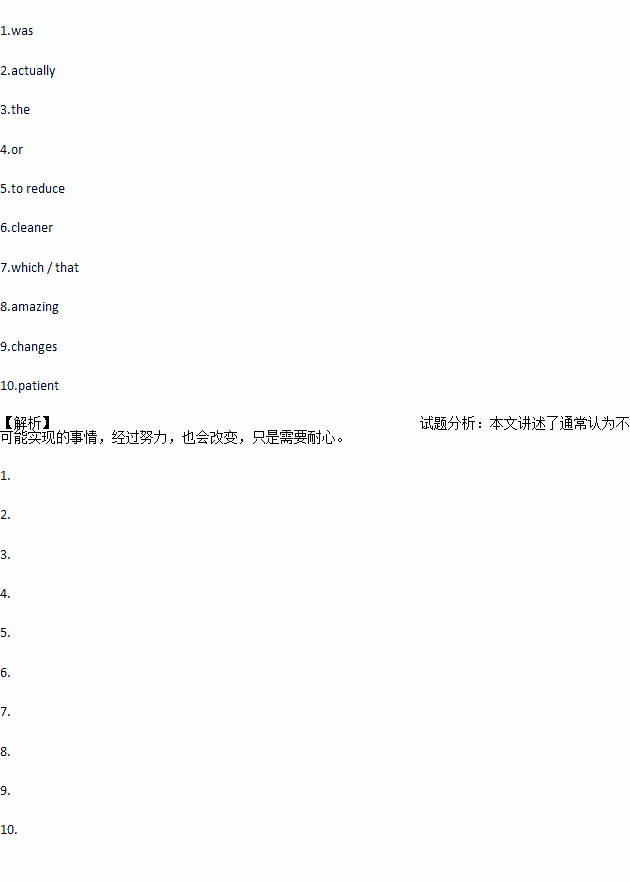题目内容
Are you facing a situation that 1. (look) impossible to fix?
In 1969, the dilution was terrible along the Cuyahoga River Cleveland, Ohio. It was unimaginable that it could ever be cleaned up. The river was so polluted that it 2. (actual) caught fire and burned. Now, years later, this river is one of 3. most outstanding examples of environmental cleanup.
But the river wasn’t changed in a few days 4. even a few months. It took years of work 5. (reduce) the industrial pollution and clean the water. Finally, that hard work paid off and now the water in the river is 6. (clean) than ever.
Maybe you are facing an impossible situation. Maybe you have a habit 7. is driving your family crazy. Possibly you drink too much or don’t know how to control your credit card use. When you face such an impossible situation, don’t you want a quick fix and something to change immediately?
While there are 8. (amaze) stories of instant transformation, for most of us the 9. (change) are gradual and require a lot of effort and work, like cleaning up a polluted river. Just be 10. (patience).
Here are Travelbag, we’ve seen the world---we want you t o as well. To help you on your way, we’ve put the World on Sale. The offers you see below are just a taste of the great deals we have available. To find out more, call us on 0800 804 8911 and let our experts make your perfect trip, at the perfect price. Book by: 30 Apr.
Middle East & Indian Ocean | |
Dubai was £349 now £299 Includes fligths 3nts.4* Coral Oriental (B&B) Valid(有效的):01 Sep----30 Sep | Mauritius was £1,085 now £835 Includes flights 7nts,3+*Le Tropical (AI), Mauritius Valid: 01 May---22 Jun |
Far East | |
Thailand Beach (Cha Am) was £700 now £575 Includes flights 10nts, 3* Holiday Inn Regent Beach, Cha Am 5 FREE nts included in price Valid: 01 Sep---31 Oct. | Malaysia, Langkawi was £689 now £599 Includes fliglhts 7nts, 3* Mutiara Burau Bay Beach Resort, Langkawi Valid: 01 May---31 May. |
Australiasia | |
New Zealand was £1,059 now £989 Self-drive, 5-day car hire 2nts, 3* Best Western President, Auckland, Scenic Wonders Self-drive Valid: 05 Apr---13 Jun | Sydney was £1,049 now £979 Includes fligths 3nts, 3* Quality Inn Cambridge 2nts, 3* York Gardens Resort 2nts, 2 * Comfort Inn, Cessnoc Valid: 15 Apr.----15 Jun. |
Americas | |
Rio was £799 now £649 includes flights 7nts, 3* Golden Tulip Continental (B&B), Rio | Las Vagas was £540 now £485 Includes flights 5nts, 3* Circus Circus, Las Vagas Valid: 01 May---30 Jun. |
1.The underlined words in the first offer most probably mean ______________.
A. 3 nights at 4 stars B. 3 nights and 4 days
C. 3 or 4 places D. $3.4
2.In which of the following places may you have to change your hotel?
A. Rio B. Mauritius
C. Sydney D. Malaysia, Langkawi
3.If you want to enjoy the scenery along the driving way, you can visit_________.
A. Dubai B. Thailand Beach(Cha Am)
C. Las Vagas D. New Zealand
4.It can be inferred from the text that ___________.
A. the ad is intended for foreign travelers
B. the offer to Rio has the longest valid time
C. the booking service will last until the end of May
D. taking planes is the only way to go to those places
5.The writer’s purpose of writing this article is to __________.
A. have more people to buy from Travelbag
B. compare travel costs in different countries
C. teach tourist how to save more money
D. inform tourists of some places of interest

